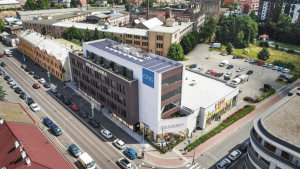
Any uncertainly around the future of Europe’s economy this year has so far failed to dampen demand for logistics space, with take up in H1 already 12% ahead of last year’s record. According to Savills, this is mainly due to the uplift in take-up of space in the Germany (4,61 milion sqm) and UK (3,93 milion sqm), while Poland (3,83 milion sqm) stands third among analysed countries.
Katarzyna Pyś-Fabiańczyk, Head of Industrial Services Hub, Savills Poland, comments: “In Poland demand for warehouse space remains at a very high level, fuelled by high interest from logistics providers and couriers, e-commerce, retail and production companies. At the end of H1 2022, only 822,500 sq m was available for lease, which makes it almost an impossible challenge to find a large warehouse unit ready for occupancy. Today growth in headline rents in Poland is estimated at around 15%, while effective rents have risen by approx. 20%.”
Investment volumes are also up on this time last year and continue to confirm investor appetite for the sector, which is currently attributable to 20% of all real estate investment in Europe.
Kevin Mofid, Head of European Logistics Research, Savills EMEA, comments: “Whilst significant headwinds are impacting the Global economy it is pleasing to see both occupier and investor demand remain un-diminished as supply chains continue to evolve in a post-Covid world”
Portugal saw the biggest uplift on H1 last year (+11566%), mainly driven by two big transactions by Blackstone, followed by Belgium (+376%), Italy (+150%), Czech Republic (+63%), Finland (+56%), Denmark (52%), Germany (+50%) and Poland (+43%). In Q2, Savills recorded that the most active logistics investors were North American and Asian investors, (%) securing the right allocation for their raised capital and dry powder.
However, most of the year’s EU investment activity was focused in Q1. In Q2, investment volumes were seen to drop by 34% y-o-y. “Rising debt costs are impacting all sectors so this drop in activity is not unique to logistics but acknowledged across the board,” says Mofid, “however, with occupier demand remaining strong, there will be opportunities for investors to continue to access the market, although we expect announcements for speculative funding to fall as investors and developers recalibrate to rising debt costs.”
According to the 2022 European Real Estate Logistics Census*, carried out in the summer of 2022 by supply chain market analysts Analytiqa on behalf of Tritax EuroBox plc, a leading investor in European logistics real estate, and international real estate advisor Savills, the building location remains the most important investment criteria indicating that prime markets will continue to receive the most interest, while ESG continues to influence investment decisions.
Savills highlights some ongoing challenges for the sector for the year ahead, including increasing inflation, reduced consumer spending, and the increasing cost of debt.
Marcus de Minckwitz, Head of Industrial & Logistics, Savills EMEA comments, “Despite the headwinds on the horizon, the market fundamentals will continue to underpin investor demand, albeit with some caution. With supply chain disruption likely only to proliferate, occupiers are certain to seek more space in order to mitigate and limit their exposure. With such an undersupply of existing and future stock, rental growth is sure to continue in core markets.”
Savills predicts that urban logistics will see the strongest rental growth in 2022, partially fuelled by the rapid increase in transportation costs, with occupiers eager to find facilities in close proximity to their customers in order to limit these growing expenditures. Over the next three years, we can expect occupiers to prioritising increasing the quantity of stock held, diversifying their supplier base, investing in building level automation and shortening (re/near-shoring) their supply chains.
Respondents to the 2022 European Real Estate Logistics Census expect electric vehicles to be the most ‘game-changing’ technological innovation to impact the supply chain in the next three years, up significantly on the prior year. This was followed by more automation (warehouse and vehicle) and predictive analytics which are also ranked higher than the prior year.
Katarzyna Pyś-Fabiańczyk, Head of Industrial Services Hub, Savills Poland, comments: “Integrated sustainability features and power resilience were cited as key priorities for occupiers and the wider macro environment is likely to push ESG higher up the agenda, with the cost of electricity likely to fuel more conversations around sustainable, resilient supply chain solutions that reduce costs and deliver social value. Greater automation and robotics are also of increasing importance as occupiers plan for the future.”
Marcus de Minckwitz concludes, “Logistics has proven to be one of the most resilient sectors throughout the pandemic and is likely to withstand the anticipated market turbulence. There is still a significant weight of capital targeting the sector and we are confident that any sign of a correction will see investors queuing up to take advantage.”



